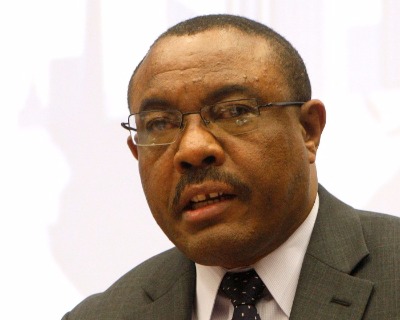The 'rejuvenation' of the Ethiopian government
The recent appointment of politically unaligned and technocratic administrators to the cabinet is aimed at consolidating the prime minister’s authority and to dilute the influence of the military ‘old guard’.

The recent appointment of politically-unaligned and technocratic administrators to the cabinet is aimed at consolidating the Prime Minister’s authority and to dilute the influence of the military ‘old guard’.
In November Prime Minister Hailemariam Desalegn implemented a broad reshuffle of his cabinet, including the appointment of 15 new ministers. The reshuffle is a strong indication of the Prime Minister’s consolidation of authority and his departure from the government’s traditional dependence on the governing Ethiopian People’s Revolutionary Democratic Front (EPRDF) to fill cabinet positions. In an unprecedented move, out of the new cabinet appointees 11 are not members of the EPRDF Executive Committee. The reshuffle is visibly aimed at placating ongoing ethnic unrest in the Oromia and Amhara regions that we believe poses the most serious threat to Ethiopian political stability. However, we have consistently forecast that Prime Minister Desalegn has for some time been planning a broader cabinet reshuffle to appoint more politically-unaligned and technocratic administrators. Our local sources report that Desalegn seeks to further consolidate his position within the government and the EPRDF coalition by placing technocratic loyalists within key positions. However, it is likely that some of these new appointees lack the political clout to go up against the interests of the EPRDF’s political elite.
The most significant new appointment is that of former State Minister of Finance Abraham Tekeste as Finance Minister. According to our local sources, Tekeste is highly experienced and a policy expert. He will replace Abdulaziz Mohammed, who lacked financial sector expertise. Tekeste’s affiliation to the Tigray Peoples’ Liberation Front (TPLF) also indicates his political influence within the EPRDF’s most powerful constituent party. Meanwhile, former Federal Police Commissioner and Transport Minister Workneh Gebeyehu replaces Tedros Adhanom Ghebreyesus as Foreign Minister. Gebeyehu hails from the Oromo Peoples’ Democratic Organisation (OPDO) constituent party and his appointment is aimed at soothing concerns within OPDO as ethnic Oromo continue to feel politically and economically marginalised. Nevertheless, Ethiopia’s foreign policy will most likely continue to be steered by the Prime Minister’s foreign affairs advisor, Berhane Gebre Christos, from the TPLF. The Tigrayan elite will also continue to dominate security policy, as well as the key economic sectors of power, transport, and industry.
Risk implications: Late Prime Minister Meles Zenawi initiated a programme of EPRDF rejuvenation in 2010 to shift power away from the old military guard, replacing top party leadership with a younger cohort. The most politically-powerful, ‘old guard’-embedded party however, the TPLF, has resisted this rejuvenation policy, causing disagreements and soul-searching amongst moderate TPLF members. Hard-core TPLF elements, some retaining key positions in security institutions, present the biggest threat to current Prime Minister Hailemariam Desalegn’s authority. Desalegn also faces competition from new generation EPRDF leaders, and his authority will be strained if economic targets are missed under the next five-year plan. The EPRDF’s domestic legitimacy rests on Ethiopia’s growth performance; lower-than-promised growth will impact Ethiopia’s national cohesion and political stability.
The resentment and frustrations within the coalition are threatening to unravel the system of ethnic federalism, which was established in 1991 to equalise the historical imbalance between various minorities and ethnic marginalisation. The legitimacy of the leadership of the Amhara National Democratic Movement and OPDO has come under question since the protests began. As Desalegn appoints loyalists, rather than Tigrayan hard-liners, into key positions, he is likely to face a backlash from the TPLF leadership. Desalegn is also likely to kick-start new corruption probes into Tigrayan business interests.
The Federal Ethics and Anti-Corruption Commission (FEACC), which reports directly to the Prime Minister, is likely to spearhead investigations into state officials suspected of corruption. Many previous senior government officials convicted of corruption charges have been members of the influential TPLF. The FEACC is now likely to embark on an anti-corruption campaign tied to slimming down the EPRDF’s 7 million-strong party membership, focusing on the lower echelons of the party, and so impacting domestic contracts more than larger foreign ones. The scope of such measures will increase, however, if irregularities in contracting result in poorer performance, and the government faces mounting domestic pressure to address this.






